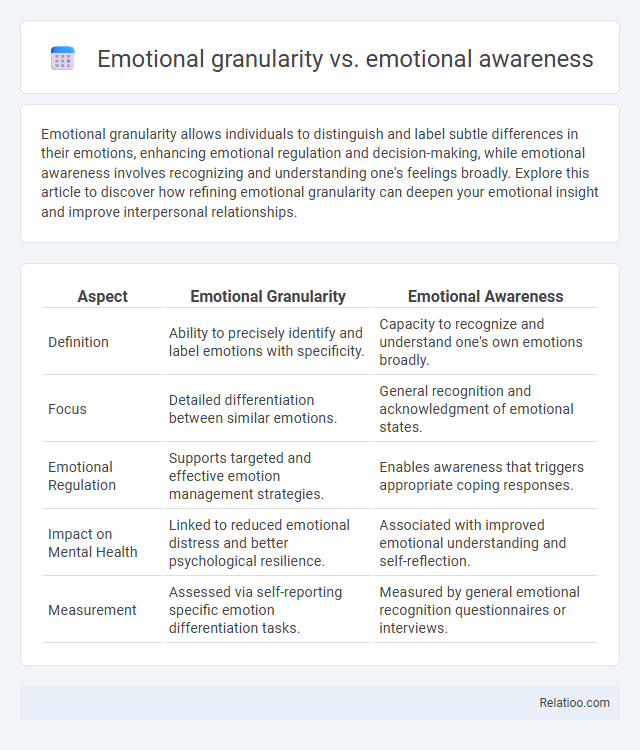Emotional granularity allows individuals to distinguish and label subtle differences in their emotions, enhancing emotional regulation and decision-making, while emotional awareness involves recognizing and understanding one's feelings broadly. Explore this article to discover how refining emotional granularity can deepen your emotional insight and improve interpersonal relationships.
Table of Comparison
| Aspect | Emotional Granularity | Emotional Awareness |
|---|---|---|
| Definition | Ability to precisely identify and label emotions with specificity. | Capacity to recognize and understand one's own emotions broadly. |
| Focus | Detailed differentiation between similar emotions. | General recognition and acknowledgment of emotional states. |
| Emotional Regulation | Supports targeted and effective emotion management strategies. | Enables awareness that triggers appropriate coping responses. |
| Impact on Mental Health | Linked to reduced emotional distress and better psychological resilience. | Associated with improved emotional understanding and self-reflection. |
| Measurement | Assessed via self-reporting specific emotion differentiation tasks. | Measured by general emotional recognition questionnaires or interviews. |
Understanding Emotional Granularity: Definition and Importance
Emotional granularity refers to the ability to precisely identify and differentiate between various emotions, enabling nuanced emotional experiences and improved emotional regulation. Emotional awareness involves recognizing and being conscious of one's emotional states but may lack the specificity that emotional granularity provides. Understanding emotional granularity is crucial for enhancing mental health, fostering better interpersonal communication, and supporting effective coping strategies by allowing individuals to respond appropriately to complex emotional situations.
What is Emotional Awareness? Key Differences Explained
Emotional awareness is the ability to recognize and understand your own emotions and their impact on behavior and thoughts. Unlike emotional granularity, which involves describing emotions with precise and nuanced words, emotional awareness focuses on identifying and acknowledging feelings as they occur. Key differences include emotional granularity's emphasis on detailed emotional labeling, whereas emotional awareness centers on the conscious perception and acceptance of emotions without necessarily requiring fine differentiation.
Emotional Granularity vs Emotional Awareness: Core Distinctions
Emotional granularity refers to the ability to identify and label emotions with precise, nuanced language, enhancing your emotional intelligence and regulation. Emotional awareness focuses on recognizing the presence of emotions but often lacks the detailed differentiation found in granularity. Understanding the core distinctions between emotional granularity and emotional awareness helps you improve emotional processing and communication by moving from simple recognition to refined emotional expression.
The Science Behind Emotional Granularity
Emotional granularity refers to the ability to identify and label emotions with precision, distinguishing subtle differences within emotional experiences, which enhances emotional regulation and mental health. Emotional awareness involves recognizing and understanding your own emotions as they occur, forming the basis for developing emotional granularity. The science behind emotional granularity highlights its link to improved psychological well-being, better decision-making, and resilience, making it a critical skill for your emotional intelligence.
Benefits of High Emotional Awareness
High emotional awareness enhances your ability to recognize and understand subtle differences in your feelings, which improves emotional granularity by categorizing emotions more precisely. This skill helps in managing stress, improving communication, and fostering empathy in personal and professional relationships. High emotional awareness empowers emotional regulation, leading to better decision-making and overall mental well-being.
How Low Emotional Granularity Impacts Mental Well-being
Low emotional granularity diminishes your ability to accurately identify and label specific emotions, leading to generalized feelings such as simply "bad" or "sad." This lack of precise emotional differentiation impairs emotional regulation, increasing vulnerability to anxiety, depression, and stress-related disorders. Enhancing emotional granularity improves mental well-being by promoting better coping strategies and fostering resilience against psychological distress.
Cultivating Emotional Granularity: Practical Strategies
Cultivating emotional granularity involves developing the ability to precisely identify and label distinct emotions, enhancing emotional intelligence beyond general emotional awareness. Practical strategies include mindfulness practices, journaling detailed emotional experiences, and expanding emotional vocabulary through reading and reflection. These techniques improve emotional regulation by enabling individuals to respond more effectively to complex feelings.
Enhancing Emotional Awareness in Daily Life
Enhancing emotional awareness in daily life involves recognizing and distinguishing specific emotions with high emotional granularity, which means identifying subtle differences between feelings rather than broad categories. This precise emotional differentiation helps individuals respond more effectively to emotional experiences, improving emotional regulation and interpersonal communication. Developing emotional granularity requires consistent practice in observing internal states and labeling emotions accurately to foster greater emotional intelligence.
Emotional Granularity and Emotional Awareness in Relationships
Emotional granularity refers to the ability to distinguish and label subtle differences in emotional experiences, enhancing communication and empathy in relationships. Emotional awareness involves recognizing and understanding one's own emotions and those of others, which fosters deeper emotional connections and conflict resolution. High emotional granularity combined with strong emotional awareness leads to improved relationship satisfaction by enabling partners to navigate complex emotional dynamics effectively.
Integrating Both Skills for Emotional Intelligence Mastery
Emotional granularity and emotional awareness are complementary skills essential for mastering emotional intelligence, with granularity focusing on precisely identifying and differentiating subtle emotional states, while awareness involves recognizing and understanding one's emotional experiences. Integrating both skills enhances emotional regulation, decision-making, and interpersonal communication by enabling nuanced self-reflection and empathy. Developing this synergy supports emotional resilience and promotes adaptive responses in complex social and personal contexts.

Infographic: Emotional granularity vs Emotional awareness
 relatioo.com
relatioo.com